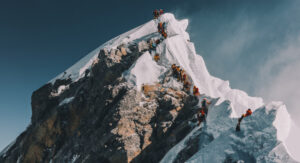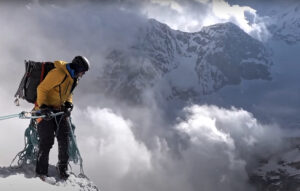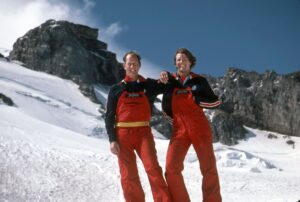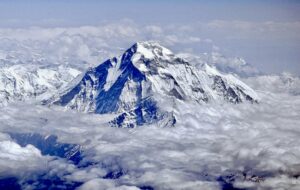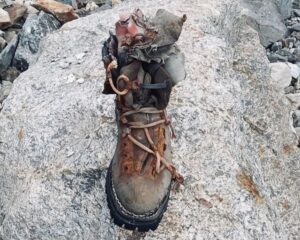In August, Hanifa Yousoufi became the first Afghan woman to summit 7,492m Mt. Noshaq, her country’s highest peak. The 24 year-old Yousoufi was part of a climbing expedition assembled by
Ascend, a U.S.-based nonprofit that uses climbing to help young women in troubled countries. ExplorersWeb caught up with Yousoufi to find out more about her climb. We also spoke to Marina LeGree and Freshta Ibrahimi of Ascend, which organized the expedition.
EW: At only 24 years old, you’re the first woman (and probably the youngest Afghan!) in your country to climb Noshaq. You spent two years training for this expedition. What are the most valuable lessons you’ve learned?
HY: When I was younger, I was not social. I was not able to understand people around me or communicate well. Maybe it was because I was illiterate. I could not move around the city by myself. I had less confidence. I did not believe in my abilities. When I wanted to do something, I knew that maybe I could it, but at the same time I did not trust myself. Since training with Ascend in fitness, running, weight-lifting and hiking, I am more confident and have no fear of traveling alone. Now if I say I want to do something, I believe I can do it.

Peak experience: An Ascend team member on a training trip in Afghanistan. Photo: juliehotz.com
EW: At 7,492m, Noshaq is high by anyone’s standards, but especially for someone who started climbing recently. What was the hardest part of your experience, and how did you feel on the summit?
HY: Walking to base camp was easy, but hiking from there to the foot of the mountain was not. There was soft snow underfoot, and progress was slow. I worried I might injure myself if I fell down. One steep section was very scary because the rocks were loose. Also, on the mountain I met another climber who was descending and he told me that two years ago, his friend lost his hand because of the cold. When I heard that, I was very scared, because if this can happen to professional mountaineers, I could easily get injured too.
I also got altitude sickness and was not able to eat. The summit felt very far away. There was a really dangerous rock and ice wall on the way to Camp Four. When I passed it, I was so happy. As we climbed higher, though, it became harder for me to breathe, and the guide said that if I couldn’t go further, I could stop there and take out the Afghan flag and celebrate. But I remembered how the team was all supporting me (including Freshta, Marina, Neki, and other girls) and I decided to keep going. When I reached the top, I was super happy and I thought that it wasn’t only my achievement, but also that of all the Afghan girls.

A popular training area is the Panjshir Valley near Kabul. Photo: Ascend
EW: What other parts of Afghanistan – and the world – would you like to visit?
HY: I want to see the Karakorum, more of Afghanistan’s mountains, Nepal and Norway. I chose Norway because our guide during the expedition told me a lot about it. Overall, I want to visit all the mountains in the world.

A group of Ascend trainees after a skills session. The man in the centre of the image, Malang Darya, became the first Afghan to climb Noshaq in 2009. Photo: Ascend
EW: Do you have any role models, from Afghanistan or elsewhere?
HY: Freshta is my role model in Afghanistan. She is educated and confident. Barack Obama is also my role model. He is humble and he loves the people that he serves. So, I want to be educated and confident like Freshta, and humble like Obama.

An Afghan girl during a training session. Photo: Ascend
EW: It’s clear that the team members of Ascend train hard to not only climb mountains but to also change their society. If you had the opportunity to deliver a message to young people in Afghanistan, what would you say?
HY: I want to tell Afghan women that they too can achieve their goals, like I did. Afghan women can be strong in any field they choose, not just sports.
FI: I would say to parents (especially men) that if you don’t give any other rights to your daughter, then at least give them the right to get an education. If a woman receives an education, she will find new paths in life.

Ascend members heading off in the mountains outside Kabul. Photo: Ascend
EW: Freshta, you worked as Ascend’s Project Coordinator since 2015. Given Afghanistan’s conservative norms, what is everyday life like for women in Afghanistan? How are women as role models and leaders viewed in your country?
FI: For Afghan women, everyday life can be stressful and full of questions. We need to deal with verbal and physical harassment in the street. Many things are considered taboo for us; for example, laughing or talking loud. Doing sports, driving, being a model, these are still uncommon, and some people’s behavior toward these women is not encouraging. Hanifa is my friend and my role model, but it really makes me sad that even she feels afraid to publicize her accomplishment. There are groups of Afghan women in villages who don’t have such basic rights as going to school, access to health care and leaving the house.

Looking west down the Wakhan Corridor of Afghanistan toward Tajikistan. Photo: Matthew Traver
EW: Marina, just before the expedition began, there was some fighting in neighboring Zebak province between the Taliban and Afghan National Security Forces, which nearly scuttled your plans. Did you face many such challenges in bringing a team of Afghan women to climb Noshaq?
MLG: Yes! Organizing this expedition took a tolerance for risk and uncertainty, since some things simply could not be answered until we got there. I relied heavily on my network of friends and former colleagues from the area who could give me a clear picture of the risks, and who notified me when the fighting stopped in Zebak. Convincing our team members’ parents, who are from faraway Kabul, that it was ok for us to go there required clear facts and constant updates.
The more difficult and frustrating element of the whole effort was the knee-jerk reaction to a group of women trying to climb. Plenty of men just wanted to tell us no, for no reason other than that we were women. There was a minor showdown between the local police, who insisted on some extra permissions, and Freshta, who insisted that we had the right to go ahead and hike in. Freshta was polite but did not back down. In the end, she prevailed.

Mt. Noshaq lies at the western edge of the Wakhan Corridor on the Pakistan-Afghanistan border. Safe access to the region is possible via the Iskhishim border crossing with Tajikistan. Image by Google Maps.
EW: Marina, What are Ascend’s future plans?
MLG: We started out mostly in secret, for fear of creating security problems for the girls, but that didn’t help much with fundraising and support. We’d like to expand to the provinces, so we can give rural girls a similar opportunity, and to establish hiking clubs in Kabul and elsewhere.








